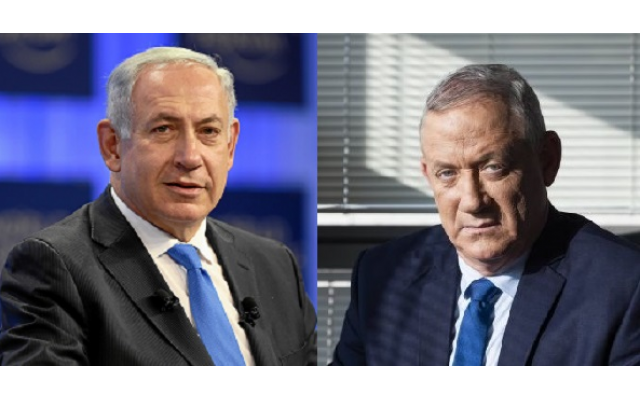No New Government as Israel Heads for Lockdown
Coronavirus pandemic complicates discussions between Benjamin Netanyahu and Benny Gantz on creating an emergency government.

Prime Minister Benjamin Netanyahu and his former opponent and probable future partner Benny Gantz had hoped to establish a unity or emergency government before Passover. However, after “meeting” over the weekend to try to work out their differences, Gantz reportedly planned to ask President Reuven Rivlin for a 14-day extension on his mandate to create a coalition government.
“Met” in the new world of coronavirus meant that Gantz sat on the patio outside the prime minister’s residence while Netanyahu sat inside. For the second time, Netanyahu was in isolation. The first time was after being exposed to an aide who tested positive for COVID-19, the illness that results from coronavirus. More recently, he was exposed again, this time to his health minister who tested positive.
The pandemic infecting Israel along with the rest of the world is only one hurdle the two men are facing. While there’s a reported partial agreement on how the ministries will be divided between the coalition parties, the two leaders are still in conflict over any possible annexation of the West Bank. Netanyahu wants to announce at least a partial annexation of the disputed territory to satisfy his right-wing partners. Gantz argues that any such move should get approval from the international community.
On Monday, April 6, Israeli media were reporting that a possible compromise was reached, although there are conflicting details. Gantz has insisted that no annexation occurs before the end of the coronavirus pandemic, and that “the prime minister and acting prime minister will act with the full agreement of the U.S. and in talks with the international community,” reported Kan, the Israeli Public Broadcasting Corp.

Another stumbling block appears to concern judicial appointments. Gantz called off negotiations after Netanyahu’s negotiating team reportedly walked back a previous agreement.
The proposed agreement between Netanyahu and Gantz calls for a rotation that would allow Netanyahu to remain as prime minister for the first 18 months, followed by a hand off of the premiership to Gantz for the following 18 months.
As The Times of Israel reported, a rotation agreement isn’t moored in Israeli law and depends on the first premier voluntarily resigning at the agreed-upon time.
There has been talk of trying to anchor the rotation into law to ensure Netanyahu vacates the position at the appointed time.
And while Rivlin has stated that he would consider a requested extension for the establishment of a government as the April 13 deadline approaches, it is unclear if the government under discussion even meets his original mandate. Gantz had received the mandate based on the majority of Knesset members who had recommended him as prime minister to Rivlin after the March 2 election – the third inconclusive election in less than three years.
But less than two weeks ago, Gantz shook the Israeli political world by entering negotiations with Netanyahu on a unity government, something he swore not to do because the prime minister is facing several charges of corruption. Gantz cited the pandemic as one reason he changed his mind, saying that the country is faced with an emergency situation.
He also stated that he didn’t want the country to be forced into fourth elections later this year. “Gantz’s calculation was that to avoid a fourth election in this time of crisis, someone needed to make a bold move to prevent this democratic gridlock from continuing,” explained Richard S. Walter, vice president of curriculum and outreach at the Center for Israel Education.

Walter added that “a coalition government is not a slam dunk.” In these historic days, nothing is certain.
As the majority of people in the United States, Israel’s citizens have been told to stay in their homes except for essential reasons. For the most part, the country has followed that instruction. However, the ultra-Orthodox communities were slow to closing their synagogues and yeshivot, and refrain from attending mass gatherings, resulting in a huge uptick in coronavirus cases.
According to Dr. Gilad Malach, director of the ultra-Orthodox society in Israel program at the Israel Democracy Institute, the ultra-Orthodox accounted for 40 percent of the coronavirus cases in the country, while making up only 12 percent of the population.
In a media briefing on Monday, Malach said there were three reasons for the spreading of the coronavirus among the ultra-Orthodox. First, the spiritual leaders didn’t heed initial warnings because they believed G-d would protect them.
Second, it took a few weeks for the national government to identify the ultra-Orthodox towns as dangerous areas. And third, the ultra-Orthodox cities are the most dense areas in Israel. In addition, the lifestyle of the men includes many communal rituals and practices.
Meanwhile, Netanyahu announced that there would be a general lockdown of the whole country starting Tuesday at 4 p.m. and only lifting on Friday at 6 a.m.
Already on Monday, police were stopping buses on the way to Jerusalem to pull out families trying to enter the city for the holiday. A curfew banning all movement outside homes on Passover eve was also put into effect.



comments